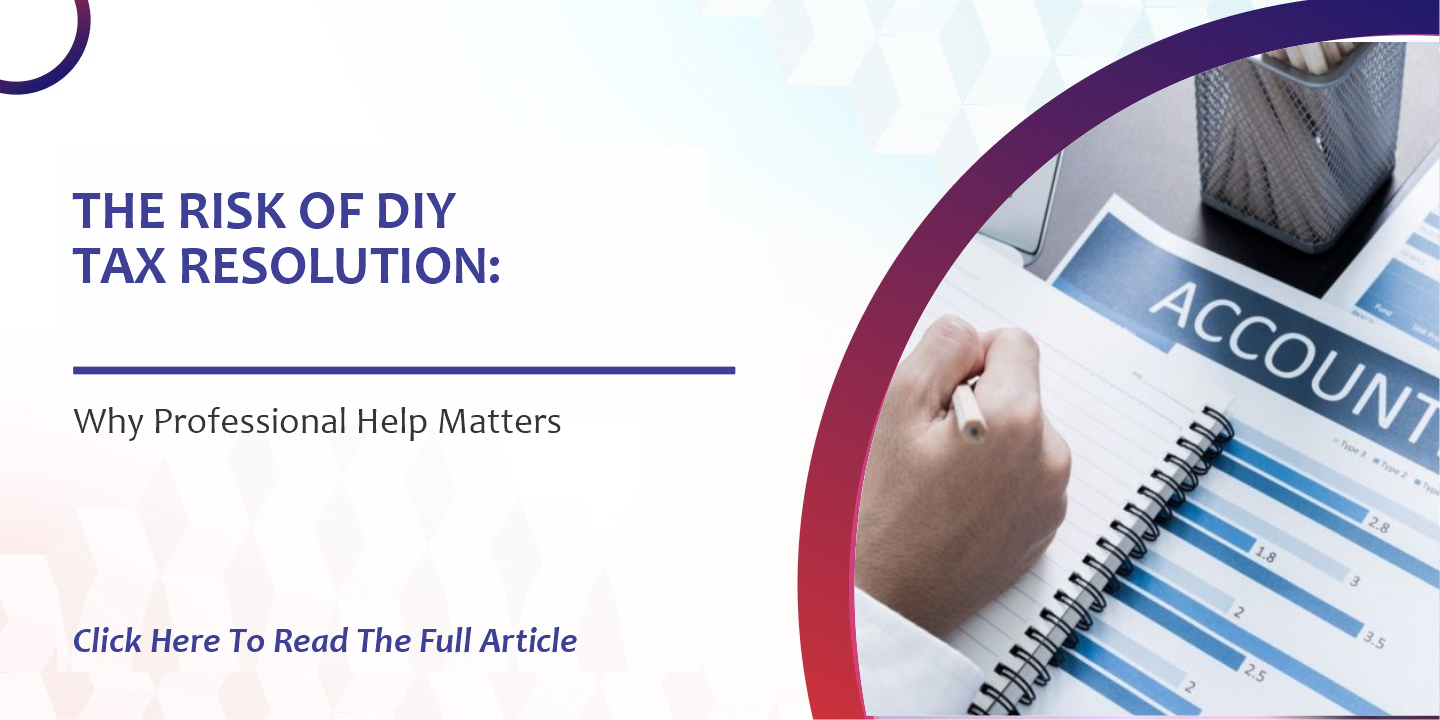Navigating the labyrinth of tax issues can be daunting. Whether you’re facing mounting tax debt, an audit, or complex compliance issues, the thought of resolving your tax problems on your own might seem like a cost-effective and empowering approach.However, the reality is that DIY tax resolution carries significant risks that could exacerbate your financial troubles.
In this comprehensive guide, we’ll explore the complexities of tax law, the pitfalls of handling tax resolution on your own, and why partnering with a professional can be a game changer for your financial future.
The Complexity of Tax Law
Constantly Evolving Regulations
Tax laws are not static; they evolve with economic, political, and social shifts. New legislation, court rulings, and regulatory updates can dramatically alter the landscape of tax compliance. Navigating these changes requires a deep understanding of current laws and how they apply to your specific situation. Professionals in tax resolution keep abreast of these changes daily, ensuring that their advice and strategies are based on the latest information.
Nuanced Interpretations and Exceptions
Tax codes are filled with nuances, exceptions, and special circumstances that can easily trip up even the most diligent DIY taxpayer. The difference between a correct resolution and a costly mistake often lies in these subtleties. For example, certain deductions or credits might only apply under specific conditions, and failing to recognize these nuances could result in an inaccurate filing that invites scrutiny from tax authorities.
The Burden of Documentation
Proper documentation is the backbone of any successful tax resolution. Whether you’re disputing an IRS notice or negotiating a settlement, you need to present a well-organized, comprehensive record of your financial history. Gathering and maintaining this documentation can be overwhelming, particularly if you’re not familiar with the specific requirements or formats that tax authorities expect. Professionals not only know what documents are needed but also how to present them effectively.
Risks of DIY Tax Resolution
1. Incomplete or Incorrect Filings
One of the most significant risks of DIY tax resolution is the possibility of incomplete or incorrect filings. Tax forms are notoriously complex, and a small error can lead to significant repercussions. Misreporting income, miscalculating deductions, or failing to account for penalties can trigger additional penalties, interest charges, or even audits.
- Example: Imagine misinterpreting a recent tax law change and filing for a deduction that no longer applies. Not only could this lead to an IRS audit, but you might also end up owing more in back taxes and penalties than you initially anticipated.
2. Missed Deadlines
Timeliness is critical in tax resolution. The IRS has strict deadlines for filing responses, paying taxes, and appealing decisions. Missing these deadlines, even by a few days, can result in the loss of opportunities to resolve issues favorably or to appeal decisions. DIY taxpayers often underestimate the importance of time management, leading to rushed submissions and costly oversights.
3. Inadequate Negotiation with Tax Authorities
Negotiating with the IRS or state tax authorities is a skill that professionals hone over years of experience. DIY approaches can leave you unprepared for negotiations, which may result in less favorable settlements or the outright denial of your proposals. Tax resolution professionals understand the nuances of negotiation tactics, which can significantly reduce your tax liabilities.
4. Increased Stress and Financial Strain
Managing tax resolution on your own can be incredibly stressful. The pressure to get every detail right, combined with the fear of making a mistake, can lead to anxiety and sleepless nights. This stress can have a ripple effect, impacting your personal and professional life. Moreover, the financial strain of paying additional penalties or incurring higher interest rates due to errors can compound your original tax debt.
5. Legal and Compliance Risks
The IRS takes non-compliance seriously. Incorrect filings or failure to adhere to tax laws can result in legal action, including liens, levies, or even criminal charges in extreme cases. Without professional guidance, the risk of falling foul of these legal repercussions is significantly higher.
Benefits of Professional Tax Resolution
Expertise and Up-to-Date Knowledge
Tax professionals bring a wealth of experience and specialized knowledge to the table. They continuously update their understanding of tax laws and regulations, ensuring that your case is handled with the most current and accurate information. This expertise translates into a more efficient resolution process and a higher likelihood of a favorable outcome.
- Insight: Professionals can identify potential pitfalls and opportunities that a DIY approach might overlook. This level of insight can mean the difference between a manageable payment plan and a financial disaster.
Personalized Strategies for Your Situation
Every tax situation is unique. What works for one taxpayer might not work for another. Tax resolution professionals take the time to understand your specific financial circumstances, including your income, expenses, liabilities, and goals. They then develop a personalized strategy that addresses your unique needs while maximizing your benefits and minimizing your liabilities.
Enhanced Negotiation Skills
Negotiating with the IRS or other tax authorities requires a delicate balance of assertiveness and diplomacy. Professionals have honed their negotiation skills through years of dealing with complex tax issues. They know how to present your case, what concessions to ask for, and how to counter any objections from the tax authorities. This expertise often leads to more favorable settlements or payment plans that you might not be able to secure on your own.
Comprehensive Support and Peace of Mind
One of the greatest advantages of hiring a professional is the peace of mind that comes with knowing your case is in expert hands. Professional tax resolution services offer comprehensive support—from initial consultation and documentation gathering to filing and negotiation. This all-encompassing approach means that you’re not left to navigate the treacherous waters of tax resolution on your own.
Minimizing the Risk of Further Penalties
By ensuring that every step of the process is handled correctly, tax professionals help minimize the risk of incurring additional penalties, interest, or legal action. Their proactive approach means that potential issues are addressed before they become significant problems, protecting your financial well-being in the long term.
Case Studies: DIY vs. Professional Tax Resolution
Case Study 1: The DIY Disaster
Consider the case of a small business owner who attempted to resolve a tax debt of $50,000 on their own. Relying on online guides and outdated information, they filed several amended returns, but critical details were overlooked. As a result, the IRS flagged the filings, leading to an audit that uncovered additional discrepancies. Not only did the business owner end up paying more than the original tax liability, but they also incurred significant penalties and legal fees. This situation could have been avoided with professional intervention, where expertise and thoroughness would have mitigated the risks.
Case Study 2: The Professional Success
In contrast, another taxpayer facing a similar tax issue decided to seek professional help. A seasoned tax resolution expert reviewed their financial records, identified errors in previous filings, and negotiated a revised payment plan with the IRS. The expert’s in-depth knowledge and negotiation skills resulted in a significant reduction in penalties and interest, making the repayment terms much more manageable. The professional approach not only saved the taxpayer money but also alleviated a great deal of stress and uncertainty.
How to Choose the Right Professional for Tax Resolution
Evaluate Their Experience and Credentials
When selecting a tax resolution professional, experience matters. Look for professionals who have a proven track record in handling cases similar to yours. Credentials such as Enrolled Agent (EA), Certified Public Accountant (CPA), or tax attorney can indicate a high level of expertise and commitment to ethical practices.
Research Their Reputation
Before making a decision, research the professional’s reputation. Look for reviews, testimonials, and case studies that demonstrate their ability to deliver results. A well-regarded professional will have a history of satisfied clients and successful outcomes.
Understand Their Fee Structure
Transparency is key when it comes to fees. Make sure you understand how the professional charges for their services—whether it’s a flat fee, hourly rate, or a percentage of the tax savings achieved. Clear fee structures help you budget for the cost of professional help without any surprises later on.
Assess Their Communication Skills
Effective communication is essential in tax resolution. You need a professional who is not only knowledgeable but also able to explain complex issues in plain language. This ensures that you understand every step of the process and can make informed decisions about your financial future.
Schedule a Consultation
Most tax professionals offer an initial consultation. Use this opportunity to ask questions, understand their approach, and gauge whether they’re the right fit for your needs. A good professional will be transparent about the process and provide a clear roadmap for resolving your tax issues.
Frequently Asked Questions (FAQs)
Q1: What are the risks associated with DIY tax resolution?
A: DIY tax resolution can lead to incomplete or incorrect filings, missed deadlines, inadequate negotiations with the IRS, and increased stress. These risks may result in additional penalties, interest charges, and even legal action, making your tax problems worse instead of better.
Q2: How can a professional help me with tax resolution?
A: A professional tax resolution expert brings up-to-date knowledge of tax laws, personalized strategies for your financial situation, and superior negotiation skills. They can help minimize penalties, secure favorable payment plans, and guide you through every step of the process, ensuring a more effective and stress-free resolution.
Q3: Is hiring a professional worth the cost?
A: While there is an upfront cost to hiring a tax professional, the potential savings in penalties, interest, and legal fees often far outweigh this expense. Additionally, the peace of mind and reduced stress that come from knowing your case is in expert hands can be invaluable.
Q4: What qualifications should I look for in a tax resolution professional?
A: Look for credentials such as Enrolled Agent (EA), Certified Public Accountant (CPA), or a tax attorney. Experience, a proven track record, and positive client testimonials are also important indicators of a professional’s ability to handle your tax issues effectively.
Q5: Can a professional help if my tax debt is relatively small?
A: Yes, even if your tax debt is small, professional help can ensure that your filings are accurate and that you’re not missing any opportunities for deductions or credits. For minor issues, a professional can provide quick and effective resolutions, preventing the problem from escalating.
Q6: What should I do if I’ve already attempted DIY tax resolution without success?
A: If you’ve struggled with DIY tax resolution, it’s advisable to consult with a professional immediately. They can review your case, identify any errors, and develop a strategy to correct them. Early intervention is key to minimizing additional penalties and interest.
Q7: How long does the tax resolution process typically take when handled by a professional?
A: The timeline varies depending on the complexity of your case and the responsiveness of the tax authorities. However, professionals can often expedite the process by ensuring that all necessary documentation is submitted correctly and by negotiating effectively with the IRS. While it might still take several months, the process will be significantly smoother and less stressful.
Conclusion
In the realm of tax resolution, the risks of a DIY approach far outweigh the potential cost savings. The intricacies of tax law, the strict compliance requirements, and the potential for costly errors make professional help not just advisable, but essential. Tax resolution professionals bring a wealth of expertise, personalized strategies, and robust negotiation skills to the table, ensuring that your case is handled with precision and care.


